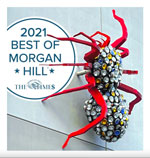The November election was historic for Morgan Hill—the first council members to be elected from districts rather than by all city voters.
The council members not only have new sets of constituents but also represent the rich diversity of our city and our state—a diversity that is not always reflected in public bodies.
Politics is about issues, policies and results, but it also is, whether we like it or not, about appearances.
So it is meaningful that three people elected to the council on Nov.6 were all people of color: Rich Constantine is our first black mayor, John McKay is of South Korean descent and
Yvonne Martínez-Beltrán is a Latina, specifically Mexican-American.
Race and ethnicity were not issues in the hard-fought campaign, as candidates rightfully campaigned on issues rather than personal characteristics. But the voters’ choices, we think, offer up a welcoming and positive image of our community to the world at large.
One of the two council members whose terms expire in 2020, Rene Spring, adds diversity as the city’s first openly gay council member. Veteran council member Larry Carr is now the longest-serving elected official on the dais. His current term also expires in 2020.
Growth and development are big issues in the city, and new council members McKay and Martinez-Beltran bring important experience here from their years on the city’s Planning Commission.
There will be tough and potentially divisive issues facing the council in the years ahead—annexations, affordable housing, homelessness and the High Speed Rail route, to name a few. Each of these issues will have different impacts on different neighborhoods, and it will be interesting to see how long council members retain their citywide perspectives while responding to parochial concerns from their specific districts.
The new district representation had little visible impact on the 2018 campaign, as candidates and voters emphasized citywide issues.
Voters also didn’t shy away from approving new local taxes. They supported continuing the county sales tax, and expressed their resounding preference for a hotel tax increase and a cannabis business tax program.
With the passage of Measure H, the city’s transient occupancy, or hotel, tax will increase from 10 to 11 percent. Also, nearly 80 percent of city voters demonstrated their clear preference for a cannabis business tax in the city. It remains to be seen if the new council interprets this vote as a mandate for a city ordinance to grant the first licenses for cannabis sales and manufacture for commercial use.
Outgoing Mayor Steve Tate offered steady leadership steady in his 12 years on the dias, and Constantine will have a unique role moving forward: He will be the only council member with a citywide constituency.
The new mayor’s 10-point plan for the city is to advocate for affordable housing, ensure sensible growth, improve traffic, preserve and create city parks, address homelessness, fix city streets, improve local internet speed and access, promote a sustainable community, keep schools safe and fully funded and require government accountability and transparency.
“The things I talked about during the campaign are definitely the things I’m going to be focusing on,” he told the Times. The city will be watching.







